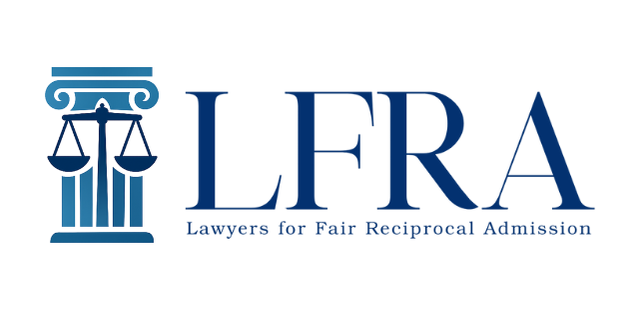
Letter to AG Explaining the Lawsuit.
April 28, 2022
U.S. Department of Justice
Attorney General MERICK B. GARLAND
950 Pennsylvania Avenue, NW
Washington, DC 20530-0001
Re: LAWYERS FOR FAIR RECIPROCAL ADMISSION v UNITED STATES, District of New Jersey, Trenton Docket 3:22cv-02399
Your Honor:
Everything a lawyer does in functioning as independent counsel in the United States — whether it is speaking to a client, associating with and representing that client, or petitioning the government for the redress of grievances — is First Amendment protected. In Holder v. Humanitarian Law Project, 561 U.S. 1, (2010), the Supreme Court unanimously held restrictions on attorneys speaking to and representing foreign terrorists were subject to First Amendment strict scrutiny review. Similar restrictions on attorney expression have been uniformly subject to strict scrutiny review. Williams-Yulee v. Florida Bar, 575 U. S. 433 (2015); Legal Services Corp. v. Velazquez, 531 US 533 (2001); NAACP v. Button, 371 U. S. 415, 433 (1963).
The Supreme Court has rejected the theory that tradition should trump constitutional analysis. See United States v. Windsor, 133 S.Ct. 2675 (2103), holding the United States government is required to afford gay and lesbian marriage licenses full faith and credit; Shelby County, Ala. v. Holder, 133 S. Ct. 2612 (2013), holding current restrictions on voting rights require current justification; Citizens United v. Federal Election Commission, 130 S.Ct. 876 (2010), holding restrictions on a corporation’s right to speak imposed by the Federal Election Committee are a prior restraint.
Prior cases challenging Federal District Court local Rules that deny equal general admission licensing privileges to out-of-state licensed attorneys have been rejected by lower courts under the so-called professional speech doctrine and rational basis review. The Supreme Court, however, has recently, squarely, and repeatedly rejected lower court licensing decisions based on the professional speech doctrine; it has rejected intermediate and rational basis review. See NIFLA v. Becerra, 138 S.Ct. 2361 (2018), overturning the Ninth Circuit and citing with disapproval lower court decision applying the so-called professional speech doctrine; Fulton v. City of Philadelphia, 141 S.Ct. 1868 (2021) overturning the Third Circuit in a licensing case; Janus v. American Federal of State, County, and Municipal Employees 138 S. Ct. 22448, 2465 (2018) (“This form of minimal [rational basis] scrutiny is foreign to our free-speech jurisprudence.”).
Alone in chambers, some federal judges might think, “So what. We wear a robe, have life tenure, have the power to do anything we want.” We are sure that you will agree such a refusal to adhere to the rule of law is legally and morally wrong. It is wrong when one party (i.e. Mitch McConnell) categorically and unilaterally blocks another party’s (President Obama) choice of representative (Merick B. Garland). The vast majority of Americans agree that this is an egregious and self-evident pervasive injustice that affects our entire nation. The challenged local Rules commit a parallel and glaring injustice. They allow forum state licensing official to categorically and unilaterally block American citizens from choosing their own representative. A citizen’s choice of counsel does not require the advice and consent of the Senate. Likewise, a citizen’s choice of independent counsel should not require the approval and consent of forum state licensing officials. The fundamental rights to counsel and to petition include the fundament rights to counsel and to petition the Article III courts.
The vast majority of Americans liked and wanted you on the Supreme Court. They agree Mitch McConnell was wrong. The vast majority of Americans also want to choose their own counsel. We can’t have you on the Supreme Court. But, we can respectfully request that you stop this glaring injustice that occurs when one party tells another who can and cannot represent them.
Respectfully submitted,
Joseph Robert Giannini
For Plaintiff,
Lawyers For Fair Reciprocal Admission
